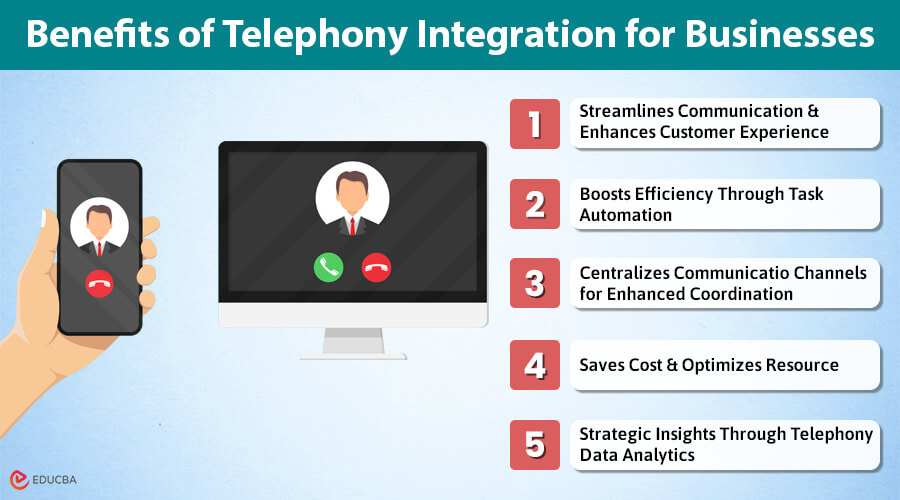
Benefits of Telephony Integration for Businesses: Overview
In the fast-paced digital marketplace, businesses constantly seek ways to enhance communication strategies and boost operational efficiency. One powerful solution at the forefront of this transformation is telephony integration. By seamlessly merging traditional voice communication with advanced digital tools, Telephony integration delivers multiple benefits that can significantly improve customer interactions and internal processes. Let us explore the benefits of telephony integration for businesses and understand why it has become a vital component in modern corporate operations.
Benefits of Telephony Integration for Businesses
Here are some of the benefits of telephony integration for businesses:
#1. Streamlines Communication and Enhances Customer Experience
Telephony integration bridges traditional phone systems with modern software, enabling businesses to handle customer interactions more smoothly. Key features, such as click-to-dial and call logging, reduce response times, automatically route calls to available agents, and provide a quicker, more seamless experience for clients. This translates to:
- Increased customer satisfaction: Swift call handling ensures minimal wait times and faster resolutions.
- Improved accuracy in communication: With integrated call history, agents can access past interactions instantly, creating a more informed, personalized service.
#2. Boosts Efficiency Through Task Automation
A key benefit of telephony integration for businesses is its power to automate routine tasks, freeing employees to focus on more important responsibilities. By minimizing manual call handling, telephony integration:
- Reduces workload on staff, allowing them to dedicate more time to complex issues and decision-making.
- Improves operational efficiency as employees no longer need to switch between multiple communication systems.
- Supports remote work flexibility by providing employees with access to phone systems from any location, ensuring consistent customer service wherever the team is based.
#3. Centralizes Communication Channels for Enhanced Coordination
Telephony integration consolidates various communication platforms—such as phone, chat, and email—into a unified system, making it easier for teams to coordinate. Centralizing communication offers several advantages:
- Simplified workflows: A single platform reduces time spent navigating between systems.
- Efficient customer service: Agents have a comprehensive view of all previous customer interactions, enabling a more cohesive and knowledgeable response.
- Scalability: As businesses grow, integrated systems can easily adapt, allowing new channels or features to be added without major infrastructure changes.
#4. Saves Cost and Optimizes Resource
Integrating telephony systems can lead to substantial cost savings, making it a wise choice for businesses of any size. The cost-effectiveness of telephony integration is evident through:
- Reduced hardware expenses: By consolidating systems, companies can eliminate redundant hardware and reduce IT support costs.
- Automated updates: Service providers handle system maintenance and updates, saving time and expenses associated with manual upgrades.
- Higher return on investment (ROI): Freeing up employees from routine tasks lets them focus on strategic initiatives that drive revenue growth.
#5. Strategic Insights Through Telephony Data Analytics
With telephony integration, businesses gain access to telephony data analytics that provide valuable insights for performance measurement and decision-making. Through call data, businesses can:
- Analyze performance metrics and call trends to find areas that need improvement.
- Tailor customer service strategies by understanding peak call times, common inquiries, and customer preferences.
- Use data to guide product development and marketing strategies, making sure that what the business offers meets customer needs.
By using telephony data strategically, companies can not only enhance customer interactions but also make informed decisions to drive growth and innovation.
Final Thoughts
Telephony integration is more than just an upgrade to business communications; it is a strategic tool that changes how companies connect with customers and handle internal processes. By embracing the benefits of telephony integration for businesses, organizations can enjoy streamlined communication, an improved customer experience, significant cost savings, and powerful insights for smarter decision-making. This technology is a testament to how leveraging the right tools at the right time can be a game-changer in the competitive business landscape.
Recommended Articles
We hope this overview has highlighted the numerous benefits of telephony integration for businesses. Check out these recommended articles for further insights on optimizing communication strategies and enhancing operational efficiency.

